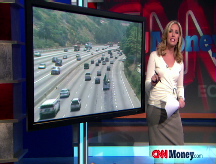More Americans feel gas price pain
CNN/Opinion Research poll finds high prices causing hardship for three quarters of Americans.
NEW YORK (CNNMoney.com) -- The high price of gas is taking a financial toll on an increasing number of American households, according to a poll released Friday.
A CNN/Opinion Research poll found that 75% of respondents said the price at the pump is a "financial hardship." That finding was up from 60% in late April and 69% in April 2006.
The poll, which has a margin of error of 4.5%, was conducted July 27-29 and involved more than 500 respondents.
In the poll, 27% said high petroleum prices were causing a "severe hardship" on their standards of living. Another 48% said gas prices caused a "moderate hardship."
Families with middle and lower incomes are feeling the sting more acutely, as rising gas and food prices spill into the core inflation rate, according to Heidi Shierholz, an economist at Washington, D.C.'s Economic Policy Institute, considered a liberal research firm.
"Households that use a higher proportion of their income on those two things are going to face the biggest hit to their take-home income," she said.
On Friday, the average price for a gallon of unleaded gasoline was $3.898, according to motorist group AAA. While that was down more than 21 cents from a record high of $4.114 a gallon on July 17, it was more than $1 higher than the $2.865 level of a year ago.
Americans remain largely pessimistic about the financial drain at the pump, according to a separate CNN/Opinion Research poll released Friday of more than 500 people.
Asked if they think the price of gasoline will be higher a year from now, about the same or lower, 51% of 514 respondents said they think prices will be higher.
In the same survey, 52% of respondents predicted gas prices will never be lower.
The higher gas prices come as many Americans may face reduced hours and even job losses in the economic slowdown, Shierholz said.
"The job market is not going to turn around any time soon," she said, and so those struggling with higher gas prices "won't find solace in the job market for quite some time."
And despite the hardships posed by high prices, consumers aren't likely to drastically alter their driving habits, said Chris Lafakis, an associate economist at Moody's Economy.com, an economic analysis firm based in West Chester, Pa.
If people have to drive 15 miles to work, for example, they're likely to continue the same commutes in the short term until they find other ways to get around, such as mass transit or more fuel-efficient cars, Lafakis said.
"In the short term, consumer grumbling is all bark and no bite," he said. ![]()





